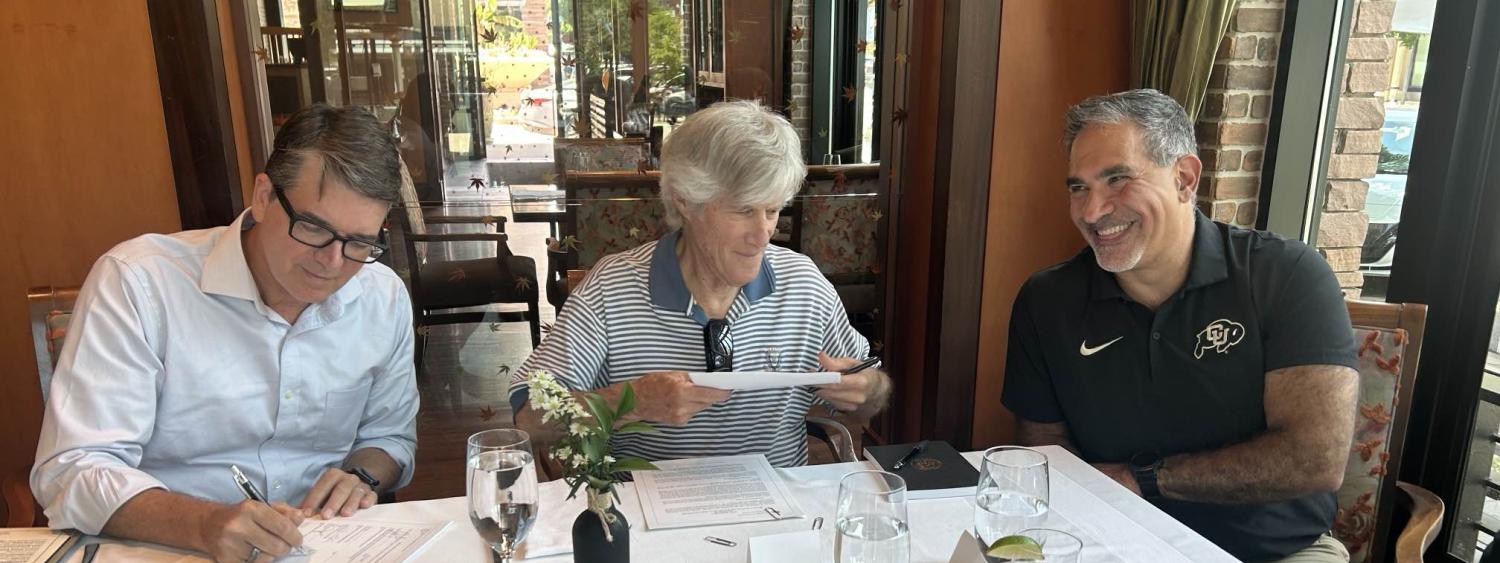$10M investment to invigorate sustainability education at CU Boulder

Left to right: Vice Chancellor for Sustainability Andrew Mayock, alumnus and donor Spike Buckley, and Chancellor Justin Schwartz at the signing ceremony.
A $10 million gift from a CU Boulder alumnus will transform the way sustainability is taught at CU Boulder—empowering students and faculty to create a more environmentally sustainable future in the face of a changing climate.
Through a venture-style investment designed for rapid impact, the gift from Spike Buckley will establish the Buckley Center for Sustainability Education. Buckley’s donation will provide $2 million annually for the next five years to implement a robust sustainability curriculum across campus, advance faculty impact and educate students for a more sustainable future.
“CU Boulder is already a powerhouse in sustainability and climate research,” said Chancellor Justin Schwartz. “Spike's remarkably generous gift will allow us to better support the growing number of students across disciplines who are seeking the knowledge, skills and experiences to lead and thrive in a rapidly changing world.”
Investing in a more sustainable future
Universities play a key role in helping students engage with the environmental challenges shaping our future. The new Buckley Center for Sustainability Education will guide this work at CU Boulder, providing resources to students, faculty and staff to deepen their knowledge and strengthen their ability to integrate sustainability into the curriculum.
In this way, the center will help respond to the growing demand for sustainability education and support students in their pursuit of meaningful work.
Through course development, teaching collaborations, learning modules and tech tools, the center will create best practices and offer support for integrating sustainability concepts into courses across campus. The center will also support faculty in effectively teaching sustainability concepts—for example, through a fellowships program, curriculum ambassadors, professional development and recognition for outstanding sustainability educators.
“The Buckley Center will use a hub-and-spoke approach to accelerate this work, serving as the central coordinator for sustainability-related curricular efforts on campus,” said Andrew Mayock, CU Boulder’s vice chancellor for sustainability.
“By fostering a collaborative and dynamic environment for learning, research and real-world application, the center will not only prepare students to tackle environmental challenges but empower them to lead global solutions.”
Lastly, all students on campus will have the opportunity to participate in experiential learning, civic engagement, career pathways and leadership development related to sustainability, including through a new, competitive Buckley Scholars Program for students committed to sustainability work.
CU Boulder is uniquely equipped to continue its leadership role in sustainability education. By combining its legacy of environmental leadership—including its fifth STARS Gold rating from the Association for the Advancement of Sustainability in Higher Education—with world-renowned research institutes, academic programs and local partners, the university is an ideal hub for advancing innovative learning.
“The impact of these efforts will resonate around the world, preparing graduates who are equipped to shape a sustainable future for all,” Mayock said.
A legacy of impact
Spike Buckley is a proud graduate of CU Boulder’s economics program and a successful real estate redeveloper with four decades of experience across the U.S. and Canada. A longtime environmental philanthropist and advocate, Buckley founded the nonprofit Earth’s Call Fund in 2019 and One Earth Philanthropy in 2021 to help discover and fund climate solutions.
He has been recognized for his leadership in climate action, including with the Earth Legacy Leadership Award from the American Renewable Energy Day Summit in 2019. He has also served on the boards of several organizations focused on climate, public health and technology, and actively supports a wide range of environmental and conservation causes.
Buckley's gift to establish the Buckley Center for Sustainability Education underscores his confidence and commitment to advancing education in areas critical to the planet’s future.
“Thanks to recent initiatives, events and awards, CU finds itself uniquely positioned to take a leadership role among universities in the drive toward a more sustainable world,” said Buckley. “It is my fervent hope that CU students, faculty and alumni will ultimately see the Center for Sustainability Education as their vehicle to make the world a better place for future generations.”
This gift is part of CU Boulder’s strategic vision and investments in a more sustainable future. For more information, visit colorado.edu/sustainability.
Sustainability at CU Boulder
Recognition and rankings
- First university to earn and maintain a STARS Gold rating for five consecutive cycles
- Ranked 11th in the U.S. for sustainability by QS World University Rankings (2024)
- Top five global rankings in earth and atmospheric sciences
Pioneering achievements
- First U.S. campus with a student-run Environmental Center (1970)
- Launched the nation’s first campus recycling program (1976)
- Among the first universities to commit to carbon neutrality (2007)
- First major college football stadium with a zero-waste program
- First university to sign the UN’s Sports for Climate Change Action Framework
Academic and research leadership
- Sustainability to be integrated across all colleges and schools through the Sustainable Futures Common Curriculum
- Strong national and global research collaborations with federal labs, NGOs and industry partners
- Established the campus-wide Sustainability Research Initiative (SRI) in 2024
Climate action and innovation
- Climate Action Plan targets 50% emissions reduction by 2030 and carbon neutrality by 2050
- Investments in solar, geothermal and electric fleet upgrades
- Zero-waste and net-zero initiatives in athletics facilities
- Eliminated single-use beverage plastics on campus (2025)
National leadership and partnerships
- Founding member of the University Climate Change Coalition (UC3)
- Member of the Board of Directors of the Association for the Advancement of Sustainability in Higher Education (AASHE)
- Co-hosted the inaugural Right Here, Right Now Global Climate Summit with the UN (2022)


